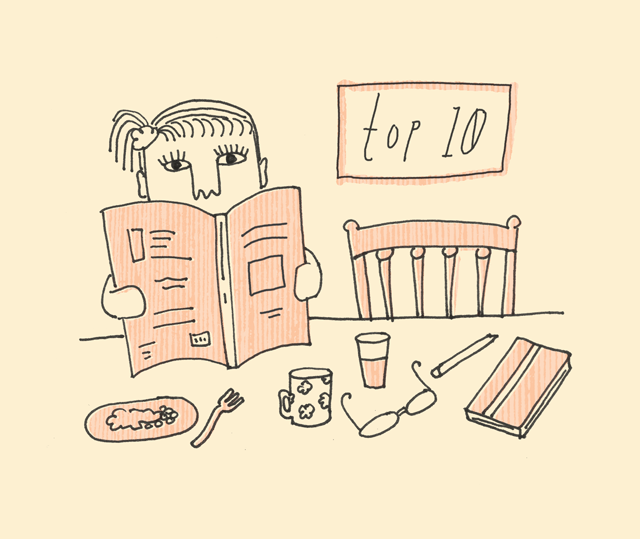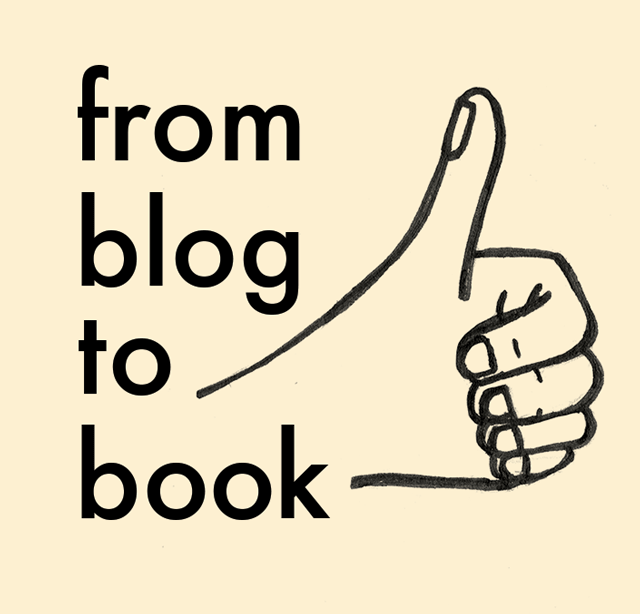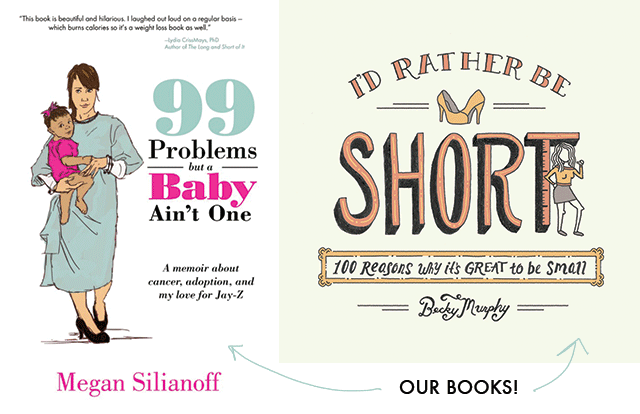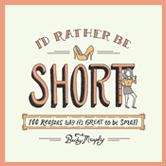I’m still so giddy about speaking with Megan Silianoff at the Texas Style Council blogging conference a couple Sundays ago. We met so many rad ladies with rad happenings up their sleeves. Grateful to be a part of it all, and extra grateful for those who the took the time to hear us talk. Megan is the woman behind Greetings from Texas. She wrote the memoir, 99 Problems But A Baby Ain’t One. She named her baby, Macy, after Jay Z. Need I say more?
During our workshop, we chatted about how we turned our blogs into books. I wrote last Monday about tips and tricks on the journey to publication. Today I share with you the top 10 lessons we learned on that journey.
—
1. It’s better to start somewhere now than to start somewhere later.
When I originally had the idea for I’d Rather Be Short, I knew it was good but I sat on it for a year because starting is hawd (that’s ‘hard’ in whiny speak). Then I ran the 1/2 marathon in March and had oodles of energy when the race was over. I channeled that into a month of drawings so I could pitch the idea to agents that May.
Guess what!
When I finally got started, the drawings were terrible!
The good news is that by starting I got through the bottom feeders faster than I would have if I was still stalling just because starting (AKA decision-making) was hawd.
2. At least try.
Megan didn’t always see herself doing this book thing, but realized she loved writing. Life dealt her an unexpected hand—she got cancer while she and her husband were trying to adopt. She felt compelled to keep everyone upbeat during this hard time, so she started a blog and from there she went. One thing I loved that Megan said at the conference was that she was so determined to get her query to the agents who represented her favorite books. She’s proud of those rejection letters because she got it into their hands. She gave it her all.
I freaked myself out one too many times thinking about how a tiny girl from a tiny town could have a real book in a STORE. I felt like a fake. Then I realized that every book in every store is either that author’s first book or they have had a first book. If you know of any second-time authors who don’t have a first book, please let me know so I can correct this point I’m trying to make.
3. Be protective of your dreams.
No, I don’t think you are going to steal my dreams. This is about protecting your sensitive, fragile, dreaming heart from others’ lack of enthusiasm, naysaying or preemptive praise. Watch Derek Sivers’ TED Talk (it’s only three minutes). Studies show that people who talk about their goals (before putting in the work) are less likely to achieve them. We get a tiny dose of satisfaction just from talking about it, and that’s enough to derail the EFFORT part of the dream. In my case, I knew that I had something good on my hands and I didn’t want somebody’s, “Oh, that’s kind of cool” comment to bring me “back to reality”. How can we expect them to be over the moon for an idea they just heard—an idea we’ve been stewing over for days/weeks/months/years? It’s not fair to them or to you, so keep it to yourself until it’s time to tell someone who will keep you accountable to seeing it through.
4. Must be delusional.
This one takes reminding. We have to be so crazy about our ideas that we work at them as if they just might work. Otherwise, beers with friends, Breaking Bad and sleeping in seem like more of a priority. I could have had better life-balance during that time, but I was crazy, so that’s what you get.
5. Level up.
Run a long race. Start a conference. Do that “thing you couldn’t do”. Then you level up. You realize you have the energy, will power, confidence, others’ support, etc. to do the next thing. You realize the doers aren’t super humans; they just do.
I’m not suggesting you add an unnecessary step in pursuing your dreams. I’m just saying that these things build on each other. Megan and I didn’t know it at the time (she started the Houston Blogging Symposium, and I ran a long race), but those feats gave us the confidence to do the next thing. We accidentally realized we are “that type” of person. (See Amy Cuddy TED Talk. One of my favorites).
6. You are who + what you surround yourself with.
This one is simple, but possibly the most impactful for me. I started the book partially because I wished it already existed. I didn’t love being so short. I thought that since so many people brought it up when they first met me (for 25 years!), I must have had what people didn’t want. I was okay enough with it, but embracing it seemed far from my reach. Throughout the process of making the book I looked at the words, “I’d rather be short” hundreds of times.
It sank in.
Recently at the airport I realized I actually would rather be short. I love my child-size self. If I got that from a few months of work, I can’t imagine how impacted I/we are by what we read and look at everyday.
I only have time for things that bring me life. I intentionally invest in those things and (try) to blow off the rest.
7. Go to conferences and writing classes!
Their our 2 many reasons 2 name 4 now, but if u go, u will right well.
Wasn’t that sentence hard to read? That’s why writing workshops and conferences are so good. Kidding! Kind of…
You really can’t lose. You’ll gain friendships with like-minded people, and you’ll become who you hang out with (remember what we just talked about.) Megan suggests BlogHer Writers, New York Pitch Conference, etc. I really love Spike Gillespie’s workshop in Austin. It’s really life-giving and you get to hear other people’s stories, essays and poems. I learned a lot by listening to them share. I didn’t do this stuff before mine got published, but I have a friend who is a writer who helped immensely before sending it to the fancy folks in New York.
8. You are going to embarrass yourself. Just do it in front of the right people.
This was Megan’s point. Preach it! She said when she turned in an early “final” copy of the manuscript, her editor/writing coach told her it definitely wasn’t done. She looks back on it now and realizes how right he was.
This whole, “it’s going to be awkward” point is worth making.
Perhaps it’s like talking to kids about drugs. You need to tell them the drugs are out there, so they’re already prepared to use one of the methods they learned in D.A.R.E. to just say no. This post is the opposite of D.A.R.E. because we think you should just say Y.E.S. to looking like a fool. Put your work out there. Austin Kleon (author of Steal Like An Artist and Newspaper Blackout) is a big fan of showing your work (see his new book).
9. It’s a new Era in Publishing.
Anything can happen. Now we can set our sights high—if it’s clever, good or low brow enough, your work can go from 0-60 in 15 seconds. I’d opt for the highbrow, but it’s your call. Don’t have a publisher or an agent? There are still millions of eyeballs glued to the internet right now. Every eyeball is looking for you. Make this easy on the eyeballs. People are looking at cat memes at 2 AM and puppy memes at 2 PM. The good ideas are not all used up. Embrace the opportunities that come with e-books and self-publishing. See last week’s post with tips and resources for that.
10. Know your comparative titles + shoot them an email
Sooner or later you’re going to have to know what your book will sit next to on shelves. Why not make it earlier? You’ll need to know for pitching to agents and publishers, but it helps in explaining it to everybody else. It helps you find your audience and it helps to see what those guys did right. I love reading interviews with Jory John and Avery Monsen (All My Friends Are Dead). Since our books will eat lunch at the same table, I think it’s wise to see what they did. Reach out! I’ve emailed several authors and almost all of them have gotten back to me. They’re people I admire and I wanted to tell them that. I didn’t always do this. We can assume our idols are too cool and busy all we want, but it never hurts to give it a shot. They are people too and if their work impacted you, do you think they’ll be upset if you tell them that?
We made it! These are a few of the many things I’ve tucked away for the last year. Take or leave it as you wish, but know that it’s all sincere. We hope it helps gain clarity, confidence or enthusiasm.
We’re just two dorkos who put our work into the world and we’d like to help others do the same.






